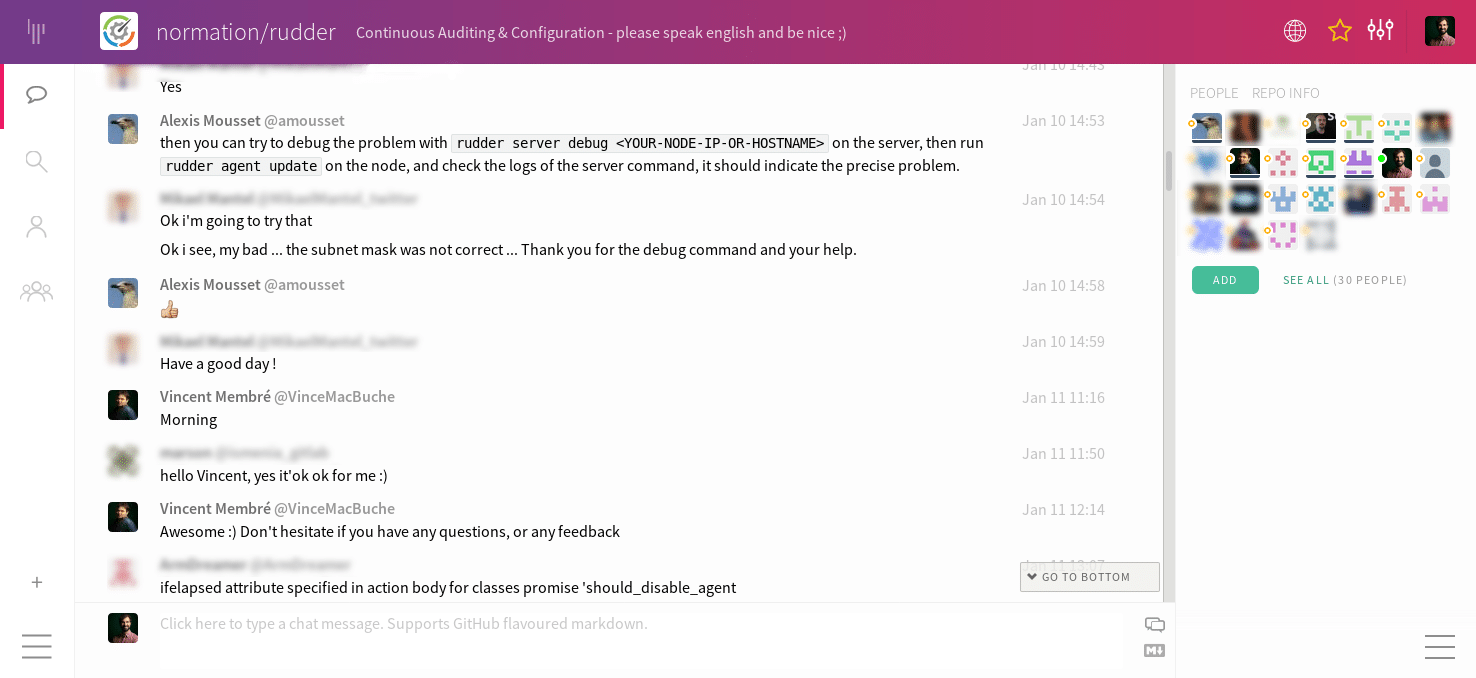Open source project
Rudder is an open source project, which means that you can freely download and modify the source code while respecting open source licenses.
We encourage and welcome any form of contribution, not just code changes: comments, reviews, help on Gitter/IRC or mailing lists, and of course code and documentation improvements.
These last two forms of contribution require more effort than others, for you and for us, so we have tried to make the process as simple as possible.
How to join the community and participate?
First of all, come and meet and introduce yourself to the community if you haven’t already done so. Exchanging with the development team and users is the best way to get to the other side of the curtain, to familiarize yourself with the different contribution opportunities and at the same time improve your deep knowledge of Rudder.
Or you can join our IRC channel #rudder on freenode (synchronized with Gitter)

Report a bug
Among the possible contributions, the simplest and most important is to report bugs to us. In the Rudder project ticket tracking system, each task is tracked, allowing us to track the progress of the project, what needs effort and who is working on it.
Create an account on our ticket tracking system.
Just open a ticket and describe your problem or suggestions.
Security vulnerabilities
Rudder security vulnerabilities are published on the Rudder announce mailing list, and mentioned in the changelogs.
You can report any security vulnerability affecting Rudder sources, packages, or infrastructure (repositories, websites, etc.) you have found by contacting Rudder security team at the following address: security@rudder.io
You can encrypt your messages using our key (fingerprint : 340C 9645 2F9A 816C 330A 99B7 C854 668E 3617 3DB3).
Contribution and licensing
We need a signed individual or entity CLA (Contributor License Agreement) before we can merge any code or documentation to Rudder.
What is a CLA ?
Given the recent developments in the legal framework surrounding patents, copyrights and their use, we want to be very clear about what we give and wait in return before we can accept a contribution. We want to be able to evolve with all these legal issues, and be able to defend the project if something unpleasant happens, or simply if a contributor changes his mind. Prevention is better than cure!
- If you are making a personal contribution, here is the reference text to consult: individual CLA.
- If you are contributing on behalf of your company, consult this version: entity CLA.
In summary (but you should really read the full text, because it alone has legal value), you state that :
- your contribution is voluntary,
- your work is your original creation,
- you grant a copyright license for your contributions to Normation, the software publisher that develops Rudder in the legal and administrative sense,
- you grant a patent license for your contributions to Normation,
- you are not required to provide support for your contributions.
The CLA does not take anything away from the open source character of Rudder and your contribution, quite the contrary. More and more open source projects require one. In fact, they are beginning to be seen and accepted exactly as they are: a legal agreement that makes it possible to be clear today, and to prevent the possible problems of tomorrow, just like a license. Our text is based on the CLA provided by the Harmony Agreement Project. The HARMONY agreements are a community group focused on contribution agreements for free and open source software (FOSS).
Once the CLA has been registered and validated on our side, you will receive a confirmation email.